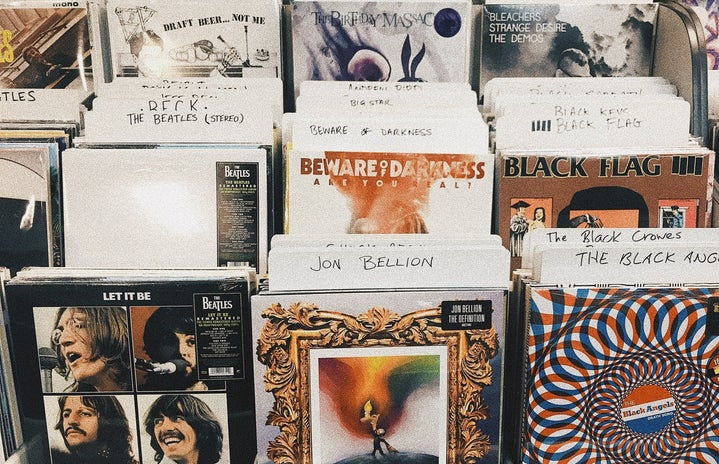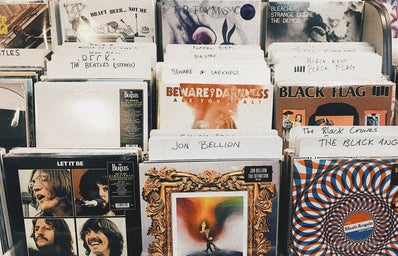The 1970s were and are not only a reference in musicality. Opening with the Woodstock music festival (1969), the seventies served as a precursor to the counterculture movements that began in the 1960s in the United States. Representing young rebels who proposed an anti-war slogan in favor of individual expression, these movements broke several established standards in behavior, clothing, and culture consumed by that generation. With this, the hippies (inspired by Janis Joplin, Bob Marley, and Jim Morrison) emerged, contesting several rules imposed by the previous generation, such as capitalism, the prohibition of drug use, wars, Catholicism, materialism, the discovery of veganism, etc.
Music, therefore, was the way these young people found to rebel against the imposed rules and show their vision of the world, using metaphors and poetry accompanied by unforgettable guitar solos.
- Led Zeppelin IV – Led Zeppelin (1971)
-
Starting with them: Led Zeppelin, started in 1968 and was composed of guitarist Jimmy Page, vocalist Robert Plant, bassist and keyboardist John Paul Jones, and drummer John Bonham. Led Zeppelin, by itself, leaves its name marked in the history of rock and music, but its fourth album undoubtedly revolutionizes the history of LPs. The band bets on long songs, such as “Stairway To Heaven“, approximately eight minutes long, something that did not happen at that time due to radio programming. However, this does not stop them from creating the album with the quality of the record in mind and leaving aside the commercial part.The album received five stars from several music critics at the time and was placed as a record that not only defines the sound of the band, but also the sound of rock in the 70s. Although the songs don’t have a social criticism character but explore to the maximum every reference in the world to put in their repertoire, it was an album very well received by the hippie and rock community, as was Led Zeppelin with their previous records.
- Close To Edge – Yes (1972)
-
The album of the British band composed by Jon Anderson, Chris Squire, Tony Kaye, Peter Banks, and Bill Bruford deals with the theme of the eternal search for the attainment of spiritual nirvana, based on the book “Siddhartha” by German Hermann Hesse. With this album, Yes was officially consolidated as one of the representatives of progressive rock. Like Led, the band follows one of the musical trends of the 70s with long songs. “Close To The Edge“, the album’s main composition, lasts eighteen minutes.The album presents to the public the creative apex of rock and of that decade, contrasting the melodic with the progressive, the dynamic with the complex. Even being composed of only three tracks, Yes brings us with this album a true inner journey in search of plenitude. With soft vocals and precise guitar and keyboard touches, “Close To The Edge” manages to establish itself in all the excellent senses of rock, music, and counterculture.
- Selling England By The Pound – Genesis (1973)
-
The band that revealed Phil Collins brings fantastic instrumentals on “Selling England By The Pound“, which also became a trend in the mid-1970s. It brings long, but not tiring songs, which complement each other with each encounter. The band uses different instrumental techniques on this album, such as arpeggios, tapping, tremolo, sitar, synthesizer, 8-voice choir, and the classic guitar, drums, and vocals.It is an aesthetically and musically delightful album. This time, it presents some social criticism in its lyrics, as in “Dancing With The Moonlit Knight“, which questions the attitudes of the English society of the time, and in the name of the album itself, which alludes to the social-economic transformation and decline of England, obsessed with consumerism and, at the same time, with monetary problems. Amidst the criticism, there are some jokes with the name of some establishments in England and references to the writers Tolkien and Shakespeare. It became revered worldwide and received praise from artists such as John Lennon.
- The Dark Side Of The Moon – Pink Floyd (1973)
-
There are no words to describe an album so well done from beginning to end. Pink Floyd, for sure, was one of the most prestigious bands of the seventies. The album is full of lyrics that make sense in any era, even almost 50 years after its composition.
With criticism of the capitalist model and the deification of money, the band brings the track “Money“, making its message very clear with noises of coins and cash registers in the background. About the song, member Roger Waters says: “At a certain point in life we must choose which side we are on, the material power of money, which buys and gets everything, or the more simplistic side, which values a life outside the consumerist demands of the upper class.”They also bring the song “Us And Them“, which presents a remarkable characteristic of the band: the political positioning. Pink Floyd was never afraid to give their opinions and always encouraged this in the listening generation of the 70s. And “Us And Them” is exactly about this, about standing up for the working people (Us) and being against those who neglect the effort and existence of the working class (Them).
In terms of musicality, the band is not out of the ordinary. Their strength is the lyrics and the composition of elements throughout the album. - A Night At The Opera – Queen (1975)
-
A “Night At The Opera” was responsible for presenting to the public one of the most prestigious songs in
most prestigious songs in history: “Bohemian Rhapsody“. Both this and the other tracks on the album focus on mixing
focus on mixing rock and classical music, thus generating a different style in the decade.
“Bohemian Rhapsody” is considered to be a masterpiece of the musical world. It is composed of tragic lyrics that at the same time bring nonsense phrases, making the work even more special.The band formed by John Deacon, Brian May, Roger Taylor, and Freddie Mercury matches in
all senses. Each member of the quartet is highlighted in each song, whether during the composition, creation, or execution phase. With this come songs like “I’m Love With My Car” and “You Are My Best Friend“, lyrics composed by Roger Taylor.
The album also includes “Love Of My Life“, a song beloved by fans, especially by the Brazilians, due to its presentation at Rock in Rio, in 1985. - Rumours – Fleetwood Mac (1977)
-
After some fights between the band members, “Rumours” is an outburst about these conflicts. This was Fleetwood Mac’s most commercial album, although their main goal was to captivate the public with the honesty present in their songs.What makes “Rumours” so captivating is the mixture of Irish Folk with the pop rhythm that was gaining strength in the late seventies. Despite adhering to the pop in their compositions, they did not leave aside their hippie side; the use of the guitar and their costumes in their performances are very characteristic of the audience that adhered to the movement.
Although they were facing problems living together at the time, the biggest hit of the album “The Chain“, was composed by all the members of the band, and all of them have a special highlight throughout the song, showing what kept them together was the music.
- Off The Wall – Michael Jackson (1979)
-
Tired of working with his family, Michael Jackson ventures out and gets it right. His first solo album “Off The Wall” is considered the singer’s best, bringing several classics that marked the decade and the introduction of pop in the 80s, such as “Don’t Stop ‘Til Get Enough” and “Rock With You“.The album exudes the energy of the nightclubs of the time, the result of this record was very satisfying, mixing elements of disco and soul music and bringing together several artists to help compose the album, such as bassist Louis Johnson and Brazilian percussionist Paulinho da Costa.
Despite not representing any counter-culture movement of the early 70s, Michael’s fame opened doors for anti-racist speech and encouraged several kids like him to win his first Grammy for the album, although he felt he deserved more than one.
- 70’s IN BRAZIL
-
In Brazil, the musical protests were carried out through the tropicália movement, similar to the hippie movement, which included great names such as Rita Lee, Elis Regina, Milton Nascimento, Chico Buarque, Caetano Veloso, Gilberto Gil, Maria Bethânia, etc.
The Brazilian Military Dictatorship (1964-1985) was in place at the time, marked mainly by censorship of artists who took a political stance or behaved out of the norm. Thus, amid so much desire to speak out and express themselves, amazing albums with metaphors and impressive lyrics emerged.
- Acabou Chorare – Novos Baianos (1972)
-
The Novos Baianos have become a national heritage, and “Acabou Chorare“, is a cultural patrimony. The album mixes Jimi Hendrix’s rock n roll with João Gilberto’s bossa nova and it is noticeable that the group got along very well. They lived together in a ranch in Jacarepaguá basing their lifestyles on hippies and spirituality. There they composed music and lyrics that supported their simple and quiet lives.With one of the best Brazilian guitar players of the time, Pepeu Gomes, the album has very well-done solos, bringing a bit of rock to the sound of the album. Some artists also influence the style of the album, such as Raul Seixas, Rita Lee and Os Mutantes.
The Novos Baianos became a nationwide known MPB group for their calm and at the same time fun songs, which despite being different, are coherent. The lightness of their lyrics certainly was the driving force behind the love for this album, especially “Preta Pretinha“.
- Clube da Esquina – Milton Nascimento & Lô Borges (1972)
-
Including samba, bossa nova, MPB, psychedelic and progressive rock and the Tropicália movement, “Clube da Esquina” presents the pinnacle of Brazilian aesthetics by two great names in music: Milton Nascimento and Lô Borges. For proposing different ideas at the time, the album did not receive good reviews in 72. However, as the years went by, its progressive musical ideals made more and more sense.
Throughout the album, there are details of Brazil and South America in music format, describing some moments related to the dictatorships that were happening in Latin America, but in a soft way, indicating at some moments the natural beauty of these places. - Fruto Proibido – Rita Lee and Tutti Frutti (1975)
-
After her departure from the Mutantes, Rita Leereleases her first solo album: “Fruto Proibido“. This decision caused some polemic at the time for two reasons: a woman deciding to leave a career with two men for a solo career, and for being expelled from the band for, according to Arnaldo Baptista, not being an instrumentalist. But Rita, an artist far ahead of her time, showed everyone that she was perfectly capable of living off her own voice.
“I was kicked out of Mutantes,” Rita says. “A statement like ‘you don’t have virtuosity for instruments and whatnot, so you’re out.’ It was then the stab in the heart of the Virgin Mary, she held her pose and said ‘cool’. She took her instruments and drove away in a Jeep. At the first corner I collapsed, it hurt so bad, it hurt so much. I cried so much, I cursed so much. And here I am today thinking that it was a gift from the gods to have been expelled from the Mutantes. I sent myself off and did well, man!”
With the support of the Tutti Frutti band, Rita was able to show all her talent as a composer and singer. The album itself brings a bluesy touch, using instruments such as the harmonica. Furthermore, she presents to Brazil the classic “Ovelha Negra“, closing the album with a golden key.
—————————————————————–
Larissa Mariano edited the article above.
Liked this type of content? Check Her Campus Casper Libero’s home page for more!


